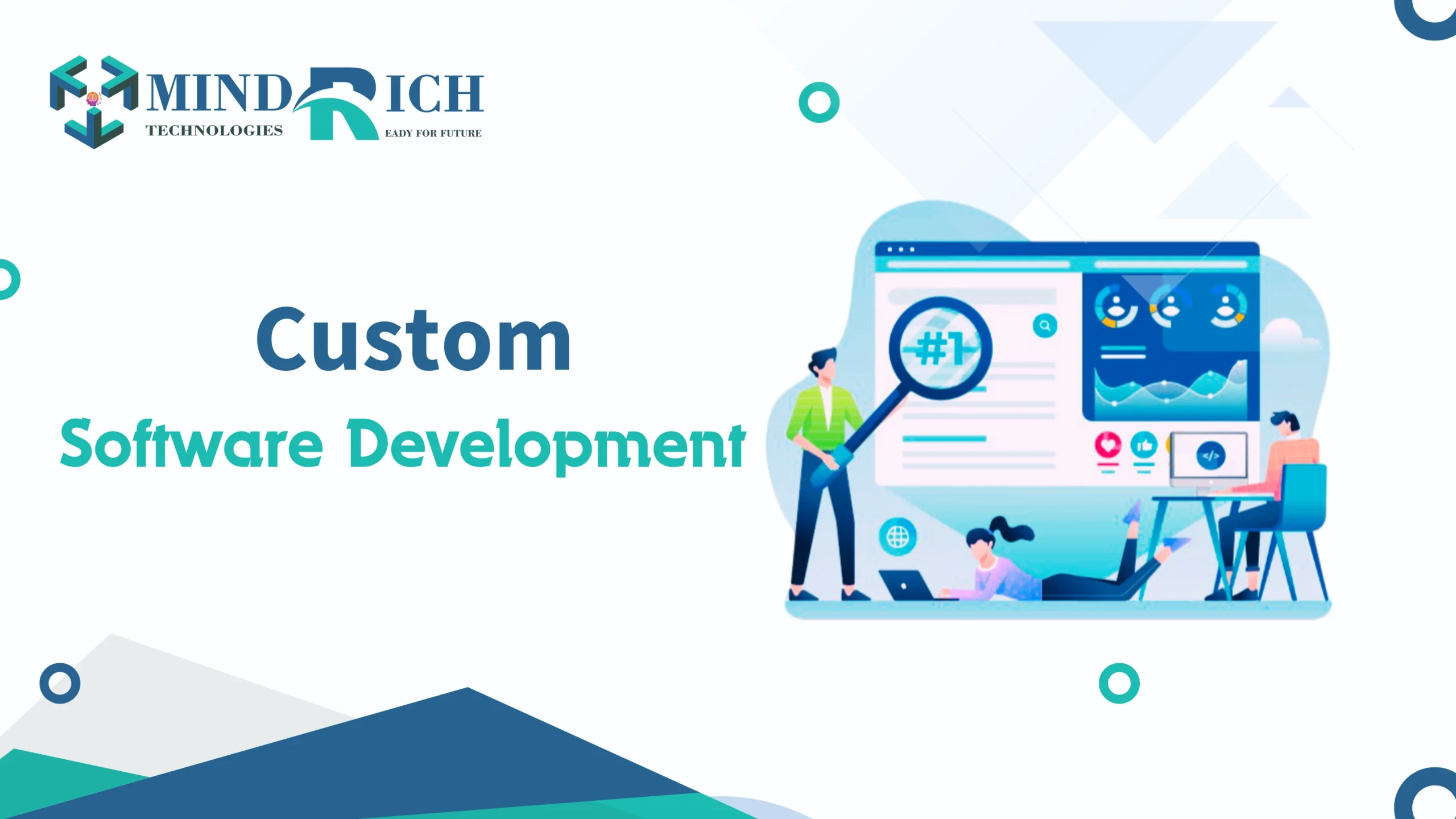In a reality where generic software frequently fails to meet needs, companies are recognizing the advantages of custom software development that match perfectly. Imagine software that comprehends your everyday tasks, evolves alongside your growth, adjusts to your workflow, and provides precisely what you need—nothing more, nothing less. That’s the guarantee of Custom software development.
Whether you’re a startup looking to optimize processes or a large company seeking a competitive advantage, bespoke software can serve as your most powerful digital partner. In this blog, we will explain what custom software truly is, why it is increasingly becoming a preferred choice for modern businesses, and how it can enable you to accomplish more with reduced effort.
Let’s explore and dive into the complete guide of customized software development solutions designed specifically for your business.
What is Bespoke Software Development?
The process of creating, developing, implementing, and maintaining software that is uniquely designed for the particular requirements of a given company, organization, or user base is known as custom software development. Custom software is created with a specific purpose in mind, closely matching the client’s workflows, preferences, and goals.
This approach involves gathering detailed requirements, designing user-centric interfaces, writing custom code, and integrating it seamlessly with existing systems. Customer relationship management (CRM) systems, enterprise resource planning (ERP) tools, mobile applications, and web-based platforms are examples of custom software. All of these are made to address specific issues or automate specific procedures.
Benefits Of Bespoke Software
Scalability and Flexibility
Your software needs will expand along with the growth of your company. Because custom software is designed to be scalable, you may add more users, modules, integrations, or features without having to completely redesign the system. It is a flexible solution that will grow with your company.
Improved Interaction with Existing Systems
Most businesses use multiple software tools for various purposes. ERP, CRM, payment gateways, and third-party APIs are just a few of the platforms that can be seamlessly integrated with custom applications to improve data flow and reduce manual work.
Long-Term Cost-Effectiveness
Although the initial investment for custom software may be more, there are substantial long-term cost reductions. You save money on regular customizations, unnecessary features, and licensing fees. Additionally, you avoid dependency on third-party vendors for updates or feature requests.
Making Decisions Based on Data
Dashboards, analytics, and reporting tools created especially to monitor important performance metrics related to your company may be examples of tailored software. It gives access to more accurate and well-informed decisions by utilizing valuable data from real-time performance monitoring.
Enhanced Automation and Efficiency
Custom solutions help automate time-consuming procedures by customizing them for your specific duties and user requirements. Improved resource management, faster workflows, and higher production ultimately save time and money.
Competitive Advantage
Custom software allows an organization to differentiate itself in functional areas where its competitors are using standard software. It helps you innovate, serve customers better, respond to market changes faster, and ultimately gain a distinct competitive edge.
Complete Ownership and Control
With custom software, the business owns the product, codes its own source, and the respective intellectual property. This gives it full control over how the system operates, who accesses it, and how the system is updated. There is no vendor lock-in, so decisions can be taken freely without being constrained by external factors.
Better Customer Experience
With your clients in mind, you may create custom applications that offer individualized user interfaces, enhanced performance, and distinctive features that boost user satisfaction. Whether it’s a web platform, mobile app, or client portal, tailored solutions foster trust and brand loyalty.
Custom Software vs Off-the-Shelf Solutions
| Features | Custom Software | Off-the-Shelf Solutions |
| Tailored to Business Needs | Highly customized | Generic |
| Time to Deploy | Longer due to development | Immediate |
| Scalability | Easy to scale | May require costly upgrades |
| Cost | High upfront, cost-effective long-term | Low upfront, recurring costs |
| Ownership | Full | Limited |
| Security | Custom security protocols | Standard security |
| Maintenance & Support | Fully controllable | Vendor-dependent |
Key Technologies in Custom Software
Programming Languages
- Frontend: React.js, Angular, Vue.js
- Backend: Python, Node.js, Java, PHP, .NET
Databases
- Relational: PostgreSQL, MySQL, MS SQL
- NoSQL: MongoDB, CouchDB, Firebase
Cloud Platforms
- AWS, Microsoft Azure, Google Cloud
DevOps & CI/CD
- Docker, Kubernetes, Jenkins, GitLab CI
APIs and Integrations
- RESTful APIs, GraphQL, third-party service integrations
AI & ML
- Recommendation engines, chatbots, fraud detection systems
Mobile Development
- Flutter, React Native, Kotlin, Swift
Cybersecurity Tools
- OAuth 2.0, JWT, encryption protocols, penetration testing frameworks
Common Types of Custom Software Solutions
Customer Relationship Management (CRM) Software:
Businesses can more efficiently handle contacts with both present and potential clients by implementing a customized CRM solution. It automates the sales, marketing, and customer support processes according to their unique workflows, customer strategies, and business objectives for a better customer experience.
Business Intelligence (BI) Software:
Raw data is transformed into actionable insights based on your key performance indicators by custom BI software. It enables companies to track operations in real time, visualize patterns, and make data-driven, well-informed decisions that boost output and profitability.
E-commerce Platforms:
Custom e-commerce solutions provide a unique and flexible online presence for businesses. They design the platforms for seamless interaction with logistics, payment gateways, inventory management, and customer support solutions to deliver a smooth shopping experience to customers.
Supply Chain Management Software:
The complete lifecycle of goods and services, from procurement and inventory management to production and delivery, optimized customized supply chain software. A unique solution ensures transparency, effectiveness, and lower operating costs across the supply chain.
Human Resource Management Software (HRMS):
Custom HRMS solutions facilitate hiring, onboarding, payroll processing, performance tracking, employee data management, and compliance monitoring. These systems are built to align with organizational structures and HR policies.
Educational Management Software:
Institutions can manage admissions, student data, e-learning platforms, virtual classrooms, attendance, and administrative procedures with the use of customized educational software. Both the learning process and operational efficiency are improved by these systems.
Enterprise Resource Planning (ERP) Software:
All essential business operations, including development, finance, sales, production, and marketing, integrate into a single system via custom ERP solutions. The integration of business operations and workflow visibility enables better decision-making and increases organizational efficiency.
Healthcare Management Software:
Custom healthcare management software, created especially for hospitals, clinics, and healthcare providers, manages patient data, electronic health records, billing, appointment scheduling, insurance processing, and regulatory compliance with increased security and privacy.
Top Industries that Benefit from Bespoke Software Development
Custom software development is not just about building something new; it’s about solving very real, specific problems that generic solutions can’t address. In fact, each industry is facing a lot of challenges regarding the rising expectations of customers, technological evolution, and increased competition. Here are some of the more popular top industries that could be seen benefited from custom software development:
1. Healthcare
Custom healthcare applications are integrated with EHR, telemedicine, and billing systems for seamless ecosystem. They provide end-to-end encryption, compliance automation, and even AI-powered techniques for individualized treatment planning-the much-needed high operational efficiency in an environment with improved patient satisfaction.
2. Manufacturing
With custom MRP (Manufacturing Resource Planning) and ERP systems, a company will manage all production workflows, quality controls, inventory controls, supply chain management, and maintenance schedules in real time. Custom IoT applications enable predictive maintenance, resulting in reduced downtimes and better quality assurance of products.
3. Energy & Utilities
Custom software can provide energy management systems with real-time monitoring, predictive maintenance, and smart grid management. Such AI and machine learning-enabled advanced big data analytics platforms help extend the capability of organizations into prediction of energy demand, optimization of resource distribution, and further improvement system resilience. These custom software solutions further track carbon-emission footprints, automate regulatory reporting, and expedite organizations’ transitions to renewables, thereby assuring compliance and operational excellence.
4. Retail and E-commerce
Tailored ERP systems and CRM tools constitute powerful bases for AI recommendation engines that empower the retailer to control his or her inventory, predict consumer social behavior, and personalize shopping experiences. Behavior and contextual real-time pricing of customized retail platforms, as well as loyalty programs, further boost customer engagement and retention.
5. Logistics and Transportation
Custom logistics applications integrate real-time tracking, algorithms for optimizing routes and fleet management dashboards. The integration with IoT devices paves the ground for predictive vehicle maintenance and live GPS tracking, thereby increasing operational transparency and cost savings.
6. Real Estate
Custom CRMs for real estate firms automate the processes of lead tracking, document checking, and electronic signing. Virtual tours, AR/VR integration, and AI-property recommendations make the process of buying very enjoyable for buyers while making it faster and more transparent for brokers and agencies closing deals.
7. Hospitality and Travel
Quickly available booking engines, smart pricing tools, and customer loyalty programs are among the things that custom hospitality management software provides. Integrated feedback systems and AI chatbots further enrich the experience of guests and enhance internal resource efficiency.
8. Banking & Finance
Custom fintech offers real-time fraud detection, automated compliance changes, and a mobile-first banking experience. In addition, blockchain integration, smart contracts, and custom trading platforms make finance operations more secure, scalable, and User-friendly.
Custom Software Development Process
The custom software development process is a structured approach to designing, building, testing, and deploying software tailored to meet specific business needs.

Selecting the Ideal Bespoke Software Development Partner
The selection of a proper custom software development company is one of the most critical decisions a customer can make. Because a wrong decision can affect the success of their project tremendously. The decision is based on many considerations apart from costs and timelines to ensure that you have chosen the most reliable, capable, and collaborative team.
Start with clearly defining your project requirements:
outline your business goals, expected features, user needs, integration points, and budget range. Having a detailed project brief helps you communicate expectations effectively and allows the development company to propose the most suitable solutions.
Assess the company’s industry experience and technological know-how:
Companies that have successfully provided solutions in the area of technologies that are relevant to your project, for instance, corporate software, cloud solutions, mobile app engineering, or web development expertise, are preferable. Knowledge of the domain in which you operate-such as healthcare, logistics, or retail-is a plus. Because it shortens the learning curve and provides perspective.
Review their portfolio and client testimonials:
Examine case studies to learn about the complexity of their projects and the significance of the results of their solutions. Sincere evaluations, recommendations, and ratings from prior customers offer important information about their dependability, work ethic, and level of client satisfaction.
Assess their development methodology and project management practices:
Professional custom software companies should stick to structured approaches such as DevOps or Agile for early problem discovery, transparent progress reports, and iterative development. For efficient communication and version control, make sure they also make use of collaborative platforms like Jira, git, Trello, or Slack.
Check for post-deployment support and scalability:
Future upgrades, performance enhancements, bug repairs, and scalability features are essential; your software journey doesn’t end with launch. Select a partner who is willing to change your application as your company expands and who can provide long-term support.
Understand their communication and responsiveness:
Effective collaboration is key, especially in custom development. The company should have clear communication channels, fluent language skills, and a proactive approach in providing feedback and clarifying doubts during the development cycle.
Examine pricing and contract clauses for transparency:
Make sure the business offers a detailed cost breakdown, regardless of whether the model is fixed-price, milestone-based, or hourly. The contract must fully cover timelines, deliverables, intellectual property ownership, security procedures, and provisions for delays or disagreements.
Verify security practices and data protection compliance:
The business should follow the strictest security guidelines and all applicable laws, particularly if it works in a regulated sector.
How Mindrich Technologies Can Help in Your Software Development Journey
Mindrich Technologies provides complete custom software development services that aim to convert your idea into powerful digital solutions. We can assist your journey in the following ways:
Scalable for Future Growth:
We build software solutions keeping your future in mind. Our software solutions are designed to grow with your business—whether you need to add more users, features, or integrations later on.
Skilled and Expert Professionals:
Our team is filled with experienced developers, designers, project managers, and business analysts who have relevant industrial experience. This provides us a benefit when it comes to developing software that will meet your business needs.
Client Focused:
At Mindrich, we believe in long-lasting partnerships, where we work closely with you, listening to your needs, and maintaining open communication throughout the engagement-your success is ours too.
Structured and Transparent Development Process:
We follow a clear-cut development process involving requirement collection, prototyping, development, testing, and deployment. We provide constant updates, customer feedback, and regular enhancements through an agile process.
Use of modern Technologies:
Modern programming languages, cloud platforms, IoT, AI, machine learning, mobile development frameworks, and other technologies enable us to create secure, scalable, powerful applications.
Success Stories:
Mindrich has successfully delivered several custom software projects in healthcare, manufacturing, retail, logistics, and education. Our solutions are helping businesses enhance their operational efficiencies, reducing costs, and giving them competitive advantage in growing.
Customized Solutions for Every Business:
We shall not have a business model one-size-fits-all. We customize each solution to your business model, workflows, and objectives, thus ensuring optimum productivity and return on investment.
Ongoing Support and Maintenance-Available:
We do not stop working just after deployment. We provide effective support on a 24/7 basis, regular upgrades, performance checks, and security updates to ensure that your software continues to run smoothly and effectively.
Seamless Integration with Existing Systems:
Our software is developed to smoothly integrate into your systems, be it ERP, CRM, or e-commerce systems, or third-party APIs, thus enhancing the efficiency of your digital ecosystem.
Whether you’re a startup or an enterprise, Mindrich Technologies is your trusted partner for building smart, efficient, and custom software solutions that drive real results.
Future Trends in Bespoke Software Solutions
Low Code, No Code Platforms:
These platforms promote faster software development by significantly reducing manual coding. Companies can rapidly create prototypes or build internal tools without severe technological insight, driving agility into innovation.
Integration of AI and Machine Learning:
AI and ML are being used more and more in custom software to automate processes, customize user interfaces, and obtain predictive insights. Intelligent data analysis, recommendation engines, and chatbots are examples of features that are increasingly commonplace.
Natives and Serverless Architecture Cloud:
Most importantly, cloud computing has changed everything; every custom software developer constructs software on a cloud-native platform. A server-less architecture makes this possible, which reduces infrastructure costs and allows the application to scale seamlessly according to the amount of usage.
Microservices, API First:
Microservices break down the application into smaller independent sections, which makes the application flexible and scalable to use. Together with API-first design, all this brings seamless integration and faster development cycles.
Enhanced Security Measures:
Today, security is the fundamental part of custom software development applications. Data encryption, multifactor authentication, and regulatory compliance with data-protection measures are part of those necessities put in place from the start.
Emphasis on Green Coding and Sustainability:
Increasing environmental consciousness is stimulating programmers to improve software for reduced energy consumption and carbon emissions in line with worldwide goals for sustainability.
Conclusion
Custom software development is no longer just about creating tools for business efficiency—it’s about innovating, adapting, and preparing for a digital future. Businesses who invest in innovative, safe, and simple custom software will be in the greatest position to prosper in a competitive marketplace as technologies advance.
Companies should keep up with these developments and collaborate closely with developers that use innovative techniques and technology stacks. By doing so, businesses can future-proof their operations and open new potential for development and innovation.
Read More: How to Prepare for the AI and The Future of Work?











